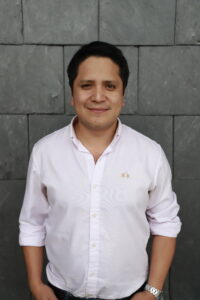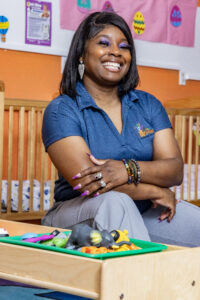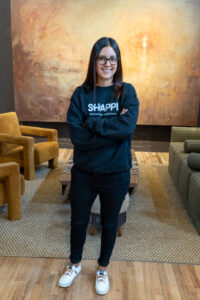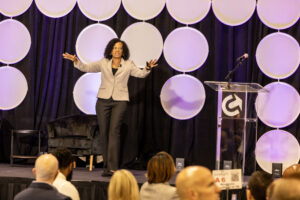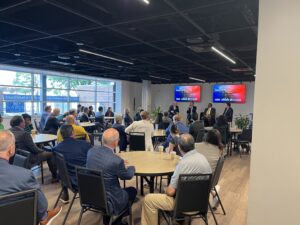Amanda Ellis
LaTrice Currie, Anchor at WRCB Channel 3, has been delivering Chattanooga news since 1995. She's an active community volunteer passionate about a range of causes including health, education and working to make a difference in the community, especially inner city and underserved communities. She is a member of the executive board of the Greater Chattanooga Chapter of Jack and Jill of America, Inc., an organization supporting African-American families.
Trend: How'd you end up in this field?
Currie: I always loved writing. I was into theater, arts and participating in plays, and in high school I shadowed a local anchor. I remember going over there and I loved it, and from then on I said, ‘This is what I want to major in when I go to college.’ I actually did it and here I am.
They say the difference between a job and a career is passion, and I really have passion for this business, the industry and journalism.
Trend: What are the best and worst parts of your job? Many people perceive broadcast journalism as glamorous.
Currie: Well, let me just say this, when the red light goes on every day we are ready. When you see us, we are dressed up. We have makeup on. Our hair is done. Or you see us out in the community at events or supporting causes. What you don’t see is what goes on behind the scenes. Preparation, helping craft scripts, getting out in the field. I enjoy being in the field for interviews.
Successful newscasts require groundwork like lots of phone calls and emails. I don't walk in here every day with my face made up and my hair done. I walk in here ready to get to work. And that's what I do.
Trend: Does someone help you with hair and makeup or do you do it yourself?
Currie: We have consultants who will give us advice, but we do it ourselves.
Trend: Does that ever annoy you that your appearance is part of your job?
Currie: There are some days that I’d love to come into work in jeans, no makeup and a ponytail. But no matter what kind of day I’m having, when I go on air all that has to disappear. The only thing that I focus on is the newscast and my presentation on air. To make sure that I'm in the moment. You're not just reading the news, you're presenting a newscast. You must think about what you're saying so that you have natural reactions.
Trend: Has that made you more mindful in other areas of your life?
Currie: Certainly when I meet people. I’m a more active listener and that's what we learn in this business − to really be good at our jobs, to present the news in an impactful and insightful way, we need to be good listeners. When I’m interviewing, I'm not just thinking ahead to the next question but really listening. That sometimes changes the direction and focus of my interview.
Trend: What’s the process of planning what news will air each day?
Currie: Well, first and foremost: editorial meetings in the morning and in the afternoon with our news director and producers. They plan the day and what gets covered by whom. They leave the meeting and start making calls.
When I come in, the first thing I do is talk with the producer. I might make script suggestions for the show and we may flip things around. Sometimes I'll write something beforehand and say, ‘Hey, let's put this in the show.’ You also go over the layout. They let you know before you go on if you're standing at the weather kiosk or starting the show on the desk. Anchors are an active participant in the show with the producer.
Trend: Have you had any embarrassing on-air moments?
Currie: Once we were trying to do a goodbye for my morning show co-anchor Jed Mescon and I was responsible for the champagne. I put it in the freezer, we opened it and it just went everywhere. Everyone was like, ‘Didn't you know not to put champagne in the freezer for that long?’ But you’re a person, not a robot. I know I'm doing my job when I'm out and people say, ‘Hello, LaTrice.’ And I stop and think ‘Wait, is this someone I know or a viewer?’
And that's the way it should be. People should feel like they know you. They let you into their homes every day. They trust you with bringing them the news and information that their family needs, and keeping them updated.
Trend: What are the most impactful stories that you work on?
Currie: Highlighting groundbreaking procedures or surgeries newly available to people in our area that can save lives, and getting the word out about important health information. I’ve partnered with the American Heart Association and Go Red for Women. How am I making sure that women know their numbers? Cholesterol? BMI? Glucose sugar levels? Blood pressure? How can we live more active and healthy lifestyles?
Inspirational weight loss stories never get old. Many of us struggle with our weight here and there – 10 or 15 pounds. But can you imagine struggling with 150 pounds? You see people lose that and it truly is amazing. And then they go on to do something like run a marathon. Those stories make a difference because there's someone sitting out there watching who's on the couch thinking, ‘I can't do this. I'm stuck.’
Trend: How has journalism changed in your career?
Currie: There’s a more conscious effort now to reach people where they are online and through social media. You’ll still have your traditional viewers, but social media is crucial. However, even with the fast pace of that, being correct is part of your credibility. So it's okay if you see someone else push news out first. You shouldn’t push that out until you make sure that it's correct and you know what you're talking about.
We want to be reliable and be the Tennessee Valley source for news and information. I like that we engage more with our viewers through social media now. It’s fun and can help us because people on those platforms could be a source for that next big story. It also provides a platform for people to say things they might not ordinarily say if they were talking to you face to face. That’s the downside, but it’s part of social media.
Trend: You've worked in Chattanooga for 20 years. What positive changes have you seen in our area? What do we still need to work on?
Currie: I’ve seen so much economic development, especially small businesses. The more growth and economic development, the more higher paying jobs you have. The better it is for your community as a whole and for families. I'd love to see us continue to grow in the areas of arts and diversity. I’d like to see us bring more diverse artists, plays and performances, so people don’t have to go to Nashville or Atlanta.
Trend: How should businesses pitch you to be covered?
Currie: First, think about why we should put you on the news. What is it that makes this business, this product stand out? How can you tell this story without it being a commercial? Why should anyone besides your business care? How will this impact and help others in our community? When you sell that story, consider what makes compelling video, because television is of course visual media.
Trend: So, once they've thought through all that, how should they share their idea?
Currie: Email or direct message on social media. If you have a personal relationship, or know whose beat it would fall under, then by all means reach out to that individual.
Trend: What do people do when they pitch you that makes your life harder?
Currie: Leaving out the basic who, what, when, where and how. Or someone sends a story, news release or email and then you say, ‘Okay, can we set that up?’ And they say, ‘Okay, what are we going to be talking about?’
Also, know your subject. Know what you're talking about if you requested an interview. Make sure you have all the elements that you need. If we need a patient or someone else on camera, make sure that’s available before you reach out to us.
Trend: Is there anything else you want people to know?
Currie: I get up every day and give my best. Some days you may do better than others, but you get back up the next day and say, ‘I'm gonna do this all over again.’ I’m really grateful for the opportunities I’ve had over the years and the things that I've been able to do and the people I've been able to meet in this community.
